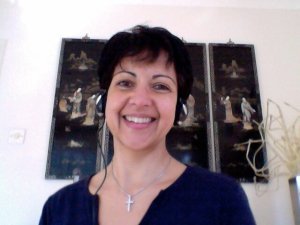Making Learning
the English Language Fun
An Interview with
Shanthi Cumaraswamy Streat
from English with a Twist

Shanthi is an English language trainer. She was born in London, UK but was brought up in Kuala Lumpur, Malaysia where her father is from. Her father's family is originally from Sri Lanka and her mother is Italian from Milano, Italy. She lives and teaches in South East London.
Shanthi teaches business people on a 1-1 basis online and offline.
In her popular blog English with a Twist she shares the different ways she teaches the English language and her enriching experiences as an English language trainer.
In this interview, Shanthi tells us about her own inspiring journey, teaching methods, and unique courses and workshops.
Let's find out more in Shanthi's words.
1. Your personal story and how you became a teacher is truly inspiring! Could you share it with our readers and tell us how after 20 years in the financial services world you became an English language trainer?
There are two parts to this answer.
First was the decision to change career and leave the finance industry. That was triggered by my cancer diagnosis in 2007. When I returned to work after 18 months of 6 operations and a grueling course of chemotherapy, the world was in the throes of the credit crunch with uncertainty all around us. We knew we were going to lose our jobs and started thinking of our options.
Second was what to do? I'd like to say that I had always wanted to be a teacher, but like many things in life, this change happened by pure chance. In fact it was an off the cuff reply I gave to a colleague who asked me what I'd do if I were made redundant.
My answer: "Oh I'll teach Italian." Eh? Teach Italian?! Where did that come from? To this day, I still don't know where the idea came from. Well, Italian soon changed to "teach English" when I realized that the demand for English was higher and my knowledge of Italian wasn't to the standard I was happy with to teach.
2. How has your background in the business world helped you as an English language trainer?
I have an understanding of the pressures of the business world. I know what it's like to have to deal with the internal politics of a company and the diplomatic language that's required in both verbal and written communication.
In business, time is money and you need to get your message across quickly, clearly and succinctly whether it's in an email or a presentation. It's a real challenge for proficient users of English to do that let alone for less proficient users.
3. What are the top three pieces of advice you would give English learners who are trying to improve their Business English?
Firstly, don't underestimate your level of English. You are probably better than you think. Sophisticated language does not equal better English. The most important thing is to get your message across clearly and that doesn't require complex language. Plain English is best.
Secondly, read and listen to a wide range of topics, not just business-related. This will widen your vocabulary and help you to rely less on business jargon. It will also help you build relationships with business contacts especially when it comes to creating a rapport and small talk.
Thirdly, write as much as you can in English. Writing allows you the time to structure your thoughts and ensure that they flow coherently. This exercise will help enormously in your written and verbal communication (emails, reports, presentations, meetings) in Business English where clarity is essential.
4. What are the top three pieces of advice you would give English teachers specializing in Business English?
Remember you're the expert in the English language NOT in business, so it's ok to ask questions. That will demonstrate an interest in your client's work.
Focus on your client's professional needs. If it's not a need, don't waste time on it!
As a Business English teacher, you're always going to learn more than the student, so be prepared to learn from your student.
5. In your opinion, what is the right sequence in teaching Business English?
The short answer - there isn't one.
6. When working with a student, what aspects do you put the most emphasis on?
Asking questions and listening to them. Their answers show me their strengths and weaknesses, their likes and dislikes and what makes them tick.
This provides the framework for my courses. I don't teach with course books. My clients are my principal resource. I am an advocate of teaching unplugged.
7. In your blog you write about how enjoyable and exciting you find the experience of teaching. Learning new things and meeting new people is exciting and fun, but there are also lists of words and charts, plus complex grammar rules to teach. How do you tackle the duller and less interesting aspects of teaching and learning?
I don't teach grammar!!! And you can forget lists of words. No one ever remembers those.
As far as the duller side of language learning is concerned, the key is showing the language in context and addressing those areas that are necessary.
I tell my clients that it doesn't matter if they make grammatical mistakes so long as those mistakes do not lead to a misunderstanding in communication.
For example, if they confuse their tenses in general conversation (perfect, past, present perfect) it is not the end of the world because the chances are people will understand what they mean.
However, if they have to present data along a timeline (eg quarterly figures, business projections) it's imperative that they use English tenses correctly. Otherwise, there could be a failure in communication.
By highlighting the need in context, teaching these "duller" aspects becomes less boring for both teacher and learner.
8. You have a rich and extensive blog. What are its most useful parts that our readers should know about?
Why, all of it, of course! Seriously, I can't answer that. I write about a variety of topics that come into my head. I don't expect that every post will be relevant to everyone. I trust my and your readers to be the best judges of what is useful for them. Hopefully, with a wide selection of topics to choose from they will find inspiration and learn something new.
9. Could you tell us a little about the different courses and workshops you offer?
All my courses, with the exception of the workshop, are delivered on a 1-1 basis and are tailor-made to my clients. The following are examples of my popular courses:
- General and Functional English (conversation, planning a
move, a holiday)
- Business English (presentation skills, small talk, in
social situations, preparing for an interview, English for Finance)
- Writing Skills (Preparing a CV and covering letters,
email/report writing)
- Business English Writing Workshop (small group) – for
companies
A three-day group workshop aimed at professionals with an upper-intermediate to advanced level of English who need to improve their written communication.
The workshop will help learners understand how to create powerful and purposeful written documents by guiding them through best practices on form, structure, and content.

10. The Full Immersion Course sounds amazing! Could you tell us more about it and the results you've seen people get from it?
My full immersion courses give learners the opportunity to "immerse" themselves in the English language and British culture by staying with us and doing a one to three week intensive course of either 15 or 20 hours a week.
The lessons are held in the morning and the afternoons are free to explore the area.
I encourage my clients to join in our social life, take in the surrounding area and use the opportunity they have to absorb as much of the English Language as they can.
We all know that you cannot learn a language in such a short period, however, a full-immersion intensive course allows a learner to get away from their own environment and regular routine for a brief period and focus totally on the language.
Many of my clients have regular English lessons back home but these can get disrupted by their work and family commitments which often leave them with a feeling that little or no progress is being made.
In those situations, the full immersion courses can act as a concentrated boost. One or two weeks of focused learning can and does make a significant difference.
Many clients are convinced they don't feel a difference after one or two weeks, but I always tell them that progress will only be felt once they return home. The reason is that the brain needs time to process all the information it has absorbed and to let it all fall in place. As it does, things begin to make more sense.
This depends very much on the level of the learner. For beginners, progress is rapid as everything is new and small steps make a big difference. Progress in higher level learners is slower but definitely there. My job is to show them that progress.
Once learners have had this boost, what they do next is equally important. During the course I spend time discussing and agreeing ways in which they can continue with their learning after they return home. Some of them continue with me through online courses; that way I follow their progress.
Thank you so much for sharing with us, Shanthi! We are sure your students and readers value your help very much!
Get Updates, Special Offers, and English Resources
Download your FREE GIFT (the first two chapters of
English Short Stories Book and Workbook)
as soon as you join!

By submitting your email, you consent to receiving updates and newsletters from us and to the sharing of your personal data with third parties for the purposes of sending you communications. We will not spam you. You can unsubscribe at any time. For more information, please see our privacy policy.
Return
from Making Learning the English Language Fun
to Really Learn English Interviews
Return
to the Really Learn English Home Page




